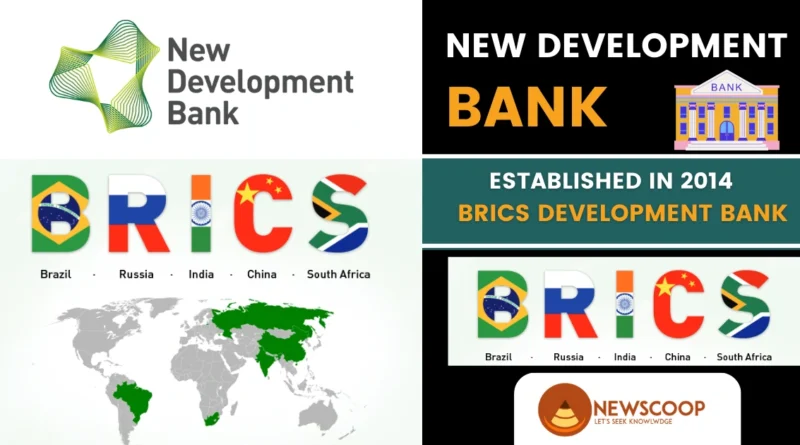New Development Bank (NDB): Members & Functions
The establishment of the New Development Bank (NDB) marks a significant milestone in the global development landscape. Founded by the BRICS nations (Brazil, Russia, India, China, and South Africa) in 2014, the NDB aims to foster sustainable development, infrastructure financing, and regional cooperation among emerging economies.
With its mandate to support projects that align with the United Nations’ Sustainable Development Goals (SDGs), the NDB has emerged as a crucial institution in promoting inclusive growth and addressing developmental challenges. This article explores the key features, objectives, and impact of the NDB, focusing on its relevance for the Union Public Service Commission (UPSC) aspirants.
Current News
New Members of NDB: In 2021, Bangladesh, the United Arab Emirates, Uruguay, and Egypt became new members of the NDB, enhancing its membership and global presence.
What is New Development Bank?
The New Development Bank (NDB) also known as BRICS Development Bank is a multilateral development bank that was established in 2014 by the BRICS countries. Further, it provides financial assistance, loans, and technical expertise to fund infrastructure projects in areas such as transportation, energy, water supply, and sanitation. Moreover, It aims to promote sustainable development, inclusive growth, and poverty reduction in its member nations.
BRICS Countries establish NDB:
- Brazil
- Russia
- India
- China
- South Africa
Headquarters: The headquarters of the New Development Bank (NDB) is located in Shanghai, China.

History & Establishment of New Development Bank (NDB)
The establishment of the New Development Bank (NDB) stems from the collaborative efforts of the BRICS countries (Brazil, Russia, India, China, and South Africa) to foster sustainable development and address infrastructure financing challenges in emerging economies. The key milestones in the history and establishment of the NDB are outlined below:
Background and Need: The idea of establishing the NDB emerged during the 4th BRICS Summit held in New Delhi, India, in 2012. The BRICS nations recognized the need for a dedicated financial institution that could address the infrastructure financing gap in emerging economies and promote sustainable development.
5th Summit in 2013: At the 5th BRICS summit held in Durban, South Africa on March 27, 2013, the leaders of the BRICS countries reached a significant agreement to establish a development bank. This pivotal decision marked a major step forward in the creation of the New Development Bank (NDB).
Agreement of NDB: The formal agreement to establish the NDB was signed during the 6th BRICS Summit in Fortaleza, Brazil, on July 15, 2014. The member countries reached a consensus on the structure, governance, and objectives of the bank through negotiations and discussions.
First President: The first President of the New Development Bank (NDB) was Kundapur Vaman Kamath.
Founding Documents: The founding documents of the NDB include the Agreement on the New Development Bank and the Treaty for the Establishment of a BRICS Contingent Reserve Arrangement. These documents outline the governance structure, shareholding arrangements, decision-making processes, and operational guidelines of the bank.
Objectives
The objectives of the New Development Bank (NDB) can be summarized as follows:
- Infrastructure development and financing support.
- Promoting sustainable development practices.
- Fostering economic cooperation among member countries.
- Contributing to poverty reduction.
- Facilitating knowledge sharing and capacity building.
Membership of NDB
The NDB operates with a system of equal shareholding and voting power among its member countries. Here are the details:
Membership: The founding members of the NDB are the BRICS countries (Brazil, Russia, India, China, and South Africa). Present members of NDB are:
- Brazil
- Russia
- India
- China
- South Africa
- Bangladesh
- United Arab Emirates
- Uruguay
- Egypt
Shareholdings: Each member country has an equal shareholding in the NDB, which means that they hold an equal portion of the bank’s capital. This equal shareholding reinforces the principle of equitable representation among the member nations.
Voting Power: Similarly, each member country has equal voting power in the decision-making processes of the NDB. This ensures that decisions are made through a consensus-based approach, giving equal weightage to the views and preferences of all member countries.
Governance
- The NDB is overseen by a Board of Governors consisting of the finance ministers from the BRICS countries.
- Each member’s voting power is determined by their shareholding in the NDB.
- Currently, all members have equal voting rights.
- While all UN members are welcome to join the NDB, the BRICS countries maintain a minimum of 55 percent of the voting power.
- The NDB’s President is chosen from among the member countries.
- India’s K. V. Kamath served as the first President.
- Brazil’s Marcos Prado Troyjo is the second and current President since 2020.
- The remaining member countries are represented by four vice presidents.
Areas of Operation
| Areas of Operation | Description |
|---|---|
| Clean Energy | NDB has approved 15 Clean Energy projects between 2016 to 2020. |
| Transport Infrastructure | NDB has approved about 17 projects in the field of transport infrastructure between 2016 to 2020. |
| Irrigation, Water Resource Management, and Sanitation | NDB has approved seven projects in this field, allocating about 1.9 billion dollars since 2017. |
| Urban Development | NDB has approved 14 Urban Development projects since 2018. |
| Environmental Efficiency | NDB has approved 1.2 billion dollars for four environmental efficiency projects between 2016 to 2020. |
| Social Infrastructure | NDB has approved three big infrastructure projects, including the building and upgrading of 58 schools. |
| Digital Infrastructure | NDB approved a project loan of about 300 million dollars for cellular network and cloud services expansion in Russia in 2020. |
| Multi-Theme | NDB has approved multi-theme projects totaling about 1.6 billion dollars since 2019. |
| Covid-19 Emergency Assistance | NDB has provided emergency assistance of about tell me Indian dollars and approved 6 loans in 2020 in response to the COVID-19 pandemic. |
Also Read: World Bank
Indian Projects Funded by New Development Bank
The New Development Bank (NDB) has provided financial support to several projects in India aimed at promoting sustainable development and infrastructure development. Some notable Indian projects funded by the NDB include:
- Delhi-Meerut Regional Rapid Transit System
- Madhya Pradesh Major District Roads Upgrade Project
- Andhra Pradesh Amaravati Sustainable Infrastructure and Institutional Development Project
- Rajasthan Water Sector Restructuring Project
- West Bengal Major Irrigation and Flood Management Project
- Maharashtra Solar Energy Project
- Tamil Nadu Sustainable Urban Development Project
- Gujarat Rural Water Supply and Sanitation Project
- Karnataka Sustainable Agriculture and Rural Development Project
- Odisha Power System Improvement Project
Conclusion
In conclusion, the New Development Bank (NDB) serves as a multilateral institution established by the BRICS countries. It aims to support development, foster economic growth, and facilitate knowledge sharing.
With equal shareholdings and voting power among its members, the NDB plays a crucial role in infrastructure development and economic cooperation. As the bank continues to expand its reach and operations, it contributes to the promotion of sustainable development and prosperity in emerging economies.
Thank You!

